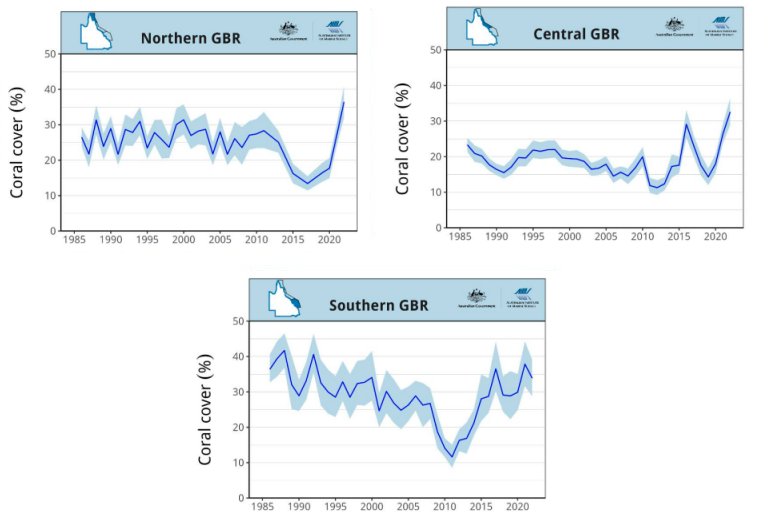
Climate change alarmists (aka global warming alarmists) are constantly making dire predictions, and over time, those predictions end up being falsified*. This doesn’t stop them from making even more dire predictions, however, since the media rarely point out how wrong they have been in the past. Usually, those dire predictions are found in the popular media, but since climate science has been infected with craziness, such nonsense even makes it into the the scientific literature.
Consider, for example, this 2012 study, which was published in the prestigious Proceedings of the National Academy of Sciences of the United States. The authors claim that their study shows coral in the Great Barrier Reef (GBR) had been declining for the past 27 years, and then they state:
Without significant changes to the rates of disturbance and coral growth, coral cover in the central and southern regions of the GBR is likely to decline to 5–10% by 2022. The future of the GBR therefore depends on decisive action. Although world governments continue to debate the need to cap greenhouse gas emissions, reducing the local and regional pressures is one way to strengthen the natural resilience of ecosystems.
So governments must act decisively to cut greenhouse gas emissions, or the GBR is going to dwindle to a fraction of its original glory. Well no decisive action was taken, and it’s now 2022, so we might as well see how close to accurate the prediction is.
Probably the most reliable source on the state of the GBR is the Australian Institute of Marine Science. Every year, it does an extensive survey of the GBR and publishes its results. The study splits the GBR into three specific regions (Northern, Central, and Southern). I showed the results from last year’s survey about a year ago. Here are the results of this year’s survey:

Notice that for the northern and central regions of the GBR, coral cover is at an all-time high, and more than THREE TIMES the value predicted in the prestigious scientific journal. While coral cover in the Southern region isn’t at an all-time high, it is still more than three times the amount that was predicted.
Obviously, then, we can add this to the ever-growing list of falsified predictions made by those who care more about scaremongering than good science.
*NOTE: By “falsified,” I do not mean “altered in order to mislead,” which is the first definition. I am using it in the scientific sense, which means “shown to be false.” Scientific theories must make predictions. If those predictions are verified, the theory gains credibility. If they are falsified, the theory loses credibility.
Return to Text

Hello Dr. Wile
I want you to know I really appreciate your text books and own a lot of what you have written. I have taught from your Biology and Chemistry. Recently I purchased Science in the Beginning which I enjoy using with my grandkids because they are all different ages and it is written to adapt for that. It has been a fun way for me, as a grandparent/science teacher by career, to interact with the grandkids in a fun but learning way. I am not their science instructor but just have been able to use it for fun reinforcement. Well done! I love being a Christian science teacher and bringing all of my areas of interest together.
I also read your Proslogion emails. I find them interesting, but I must be honest that some of the recent ones regarding the climate change issue bother me some. I am in no way an extremist pushing any panic agenda regarding this issue, but I do think that the slow steady trends are trying to tell us to use our cumulative knowledge to respect the fact that we are now attempting to balance the needs of nearly 8 billion people together on this one earth. When I teach I just like to encourage “valuing and caring for what God has given us.” It just seems so logical…why wouldn’t we have that attitude?? So it does bother me when I feel like potentially political views have tainted an approach to something. Granted, there has been some data that has not played out as some more extremists have predicted. On the other had, I have not really seen you address some of the longterm data that does show slow but steady changes. And again, why on earth would we not use the gifts God has given us in amazing scientific minds to encourage one another to take care of this earth we are blessed to live on for a while. And sadly, the Christian community in general has become the naysayers to all of this. I find it really confusing. I also find you very influential in that community so I just wanted to share my thoughts. Here is a recent article that just popped up today and made me pull your Proslogion back up to respond to you. Thanks for your considerations. Lynn https://www.yahoo.com/news/5-rare-1-000-rain-170329380.html
Thanks for your kind words, Lynn. The reason you don’t hear much about long-term trends on this site is that there aren’t many, and those that do exist (such as sea-level rise) started before 1900 and thus cannot be credibly linked to global warming. For example, that news story you posted attempts to link increased rainfall to global warming. The problem is that there is no long-term trend to rainfall, at least not according to the scientific literature. Consider this study:
https://www.sciencedirect.com/science/article/abs/pii/S002216941730478X#%21
Here are the main conclusions:
“The number of significant trends was about the number expected due to chance alone.”
“Changes in the frequency of major floods are dominated by multidecadal variability.”
(This means there are no long-term trends)
“The results of this study, for North America and Europe, provide a firmer foundation and support the conclusion of the IPCC (Hartmann et al., 2013) that compelling evidence for increased flooding at a global scale is lacking.”
I absolutely agree that we should value and care for what God has given us. The only proper way to do that is to look to science to see what the real problems are that need addressing. Right now, science tells us that global warming is not one of them. Yes, we should continue to study it, and yes, we should continue to work on alternatives to fossil fuel. However, until science tells us that there is a real problem, we should not waste billions of dollars and people’s lives.